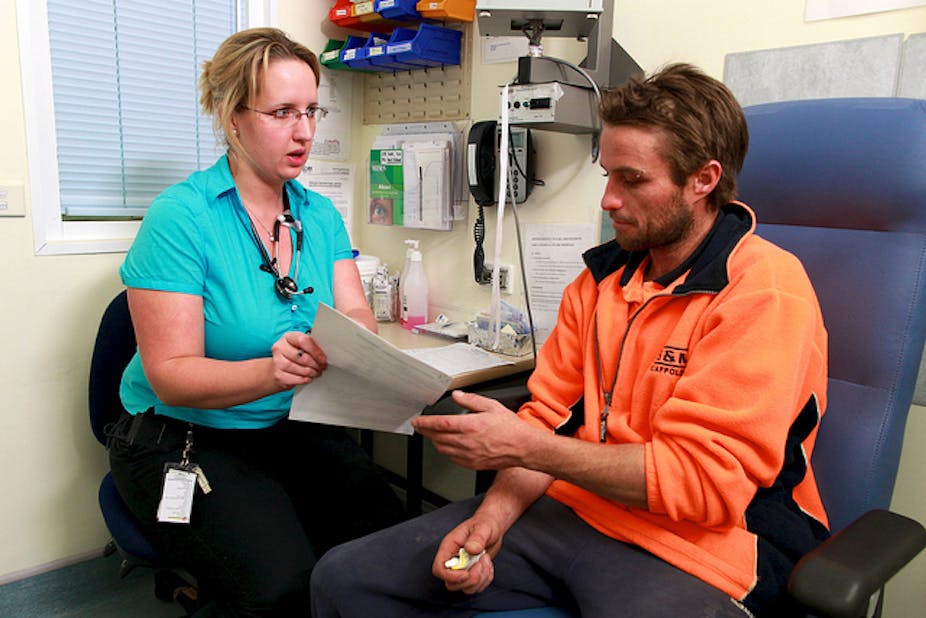Prime Minister Tony Abbott has declared that GP co-payments are “dead, buried and cremated”. This contrasts with health minister Sussan Ley’s desire to “reduce the number of bulk-billed consultations to people who can afford to pay something”.
So, what is likely to emerge from Ley’s Medicare reform consultations?
In a paper published today in the Medical Journal of Australia, our new modelling shows the freeze on Medicare fees paid to GPs will leave doctors A$8.43 worse off per consultation with non-concessional patients by 2017-18. That’s a bigger shortfall than the now-abandoned A$5 rebate cut – and is likely to prompt many GPs to start charging a co-payment.
Currently, legislative restraints mean that GPs are only able to charge the government directly for patient care (bulk-billing) if they do not charge the patient a co-payment.
However, Ley has suggested that the government would consider legislative change that would remove this restriction. This would mean that GPs could bulk-bill the scheduled fee and also charge a co-payment.
With GPs facing greater economic pressure and the health minister considering legislative changes to make it easier for GP to charge them, GP co-payments, like Lazarus, may rise again from the dead.
First, a quick recap
The first of the recent co-payment policies was revealed in the 2014-15 Federal budget. It proposed a A$7 patient co-payment for GP, pathology and imaging services to offset a A$5 reduction in the associated Medicare rebates. The financial impact of the original co-payment proposals was greatest for Commonwealth Concession card patients.
Facing strong opposition, the government withdrew the A$7 co-payment policy in December 2014, and replaced it with three new policies. The first, a ten-minute minimum for standard GP consultations (the “A$20 co-payment”) was retracted in January.
The second, a A$5 reduction in the Medicare rebate for “common GP consultations” for non-concessional patients was retracted in March. It was this retraction that led Prime Minister Abbott to state co-payments were “dead, buried and cremated”.
However, the third policy announced in December remains on the table. It is a continuation of the indexation freeze for all Medicare schedule fees until July 2018. While not a direct cut to GPs’ income, over time GPs would earn relatively less while their costs would increase.
The cost of the ‘freeze’
In our modelling for MJA, we used data from the University of Sydney’s Bettering the Evaluation and Care of Health (BEACH) study to estimate the amount of rebate claimable through Medicare per 100 GP consultations. BEACH is a continuous cross-sectional, national study of the content of GP-patient encounters in Australia.
More than half (54.4%) of GP consultations were with concessional patients (those under 16 years of age or those holding a health care card) while 45.6% were with non-concessional patients.
We calculated that in 2014-15, an average bulk-billing GP would earn A$4,998.28 from Medicare rebates per 100 consultations.
For GPs to maintain rebate income equivalent to 2014-15, the Medicare scheduled fees would have to increase in line with CPI. So assuming an annual CPI increase of 2.5%, by 2017-18 these fees would need to increase by 7.7% – A$384.32 per 100 consultations.
By freezing fees until 2017-18, the government is cutting the GPs’ gross earnings by 7.1% in relative terms. Assuming concessional patients are all bulk-billed, this A$384.32 decrease equates to A$8.43 per non-concessional patient consultation.
In comparison, the (now retracted) A$5 reduction in rebate for most consultations with non-concessional patients would have amounted to a loss of A$219.53 per 100 consultations, or A$4.81 per consultation with a non-concessional patient.
Making up the shortfall
While public discussion has focused on the now retracted A$5 reduction, the freeze will have a greater impact: A$8.43 per non-concessional patient consultation by 2017-18, nearly double the amount of the rebate reduction.
The 7.1% reduction in GP rebate income by 2017-18 from the freeze may economically force GPs who currently bulk-bill to charge a co-payment to their non-concessional patients. As Grattan Institute health economist Professor Stephen Duckett notes, this is a “co-payment policy by stealth”.
Our estimates are conservative. The A$8.43 figure would be the minimum charge needed to make up for the GPs lost income. We did not account for: administrative costs in implementing new billing systems; increased bad debt; the previous freeze of fees; and lost income when a GP chooses to bulk-bill non-concessional patients facing financial hardship.
It is therefore likely that GPs who opt to charge a co-payment, will charge more than our estimates. Further, after abandoning bulk-billing, some GPs may take the opportunity to charge more than that required to merely recoup their rebate loss.
Statements by health minister Ley and the ongoing effect of the index freeze suggest we’re likely to see GP co-payments in the near future.

